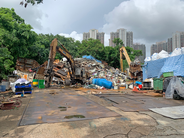The Ombudsman, Ms Winnie Chiu, announced on 3 August 2023 the launch of a direct investigation to examine the enforcement by the Planning Department (“PlanD”) and the Lands Department (“LandsD”) against unauthorised land developments.
Currently, PlanD takes enforcement action against unauthorised developments in the rural New Territories within a development permission area (“DPA”) (Note 1) pursuant to the Town Planning Ordinance (“TPO”). Specifically, developments within the DPA, including such operations as pond filling or land excavation and change of land use (such as using agricultural land for warehouses or workshops), are unauthorised unless the development is an “existing use” (Note 2) as defined by the TPO, or covered by permission granted by the Town Planning Board (“TPB”), or permitted under the statutory plan. For cases involving government land, LandsD may enforce the Land (Miscellaneous Provisions) Ordinance against illegal occupation of government land depending on the actual circumstances. Meanwhile, the land uses of urban areas and new towns not covered by DPA plans are mainly regulated by land lease provisions, building plans and various licences.
A preliminary inquiry by the Office of The Ombudsman revealed that PlanD receives over 1,500 complaints about unauthorised developments each year. Among them, hundreds have been confirmed after investigation to be non-compliant cases including repeated ones. There have also been cases involving both government and private land which required inter-departmental collaboration between PlanD and LandsD. Moreover, the media has reported from time to time on allegedly unauthorised uses of rural land in the New Territories for storage, temporary parking, etc.
Ms Chiu said, “Land is a valuable social resource requiring the Government’s prudent planning and monitoring over its use. Enforcement against unauthorised developments within a DPA aims at protecting the rural environment in the New Territories. Our Office notes that PlanD identifies hundreds of unauthorised development cases every year, some of which have come under the purview of different departments or occurred in conservation zones. Without timely rectification, these irregularities could be detrimental to social development and even the ecosystem. Our Office has received 30 related complaints over the past three years, reflecting public concern about this topic. Hence, I have decided to launch a direct investigation to examine the enforcement by PlanD and LandsD against unauthorised land developments, including their responsibilities and collaboration in handling those cases, and whether the existing mechanism is proper and effective in preventing unauthorised developments and handling relevant complaints, with a view to making recommendations to the Government for improvement where necessary.”
Note 1: DPA means an area so designated in a plan prepared under sections 3(1) (b) and 20 of the TPO, but excludes land included in a plan of an interim DPA.
Note 2: The development was in existence before the first gazettal of the statutory plans covering the interim DPA (if any) or DPA.
Source: The Office of the Ombudsman, Hong Kong, China

